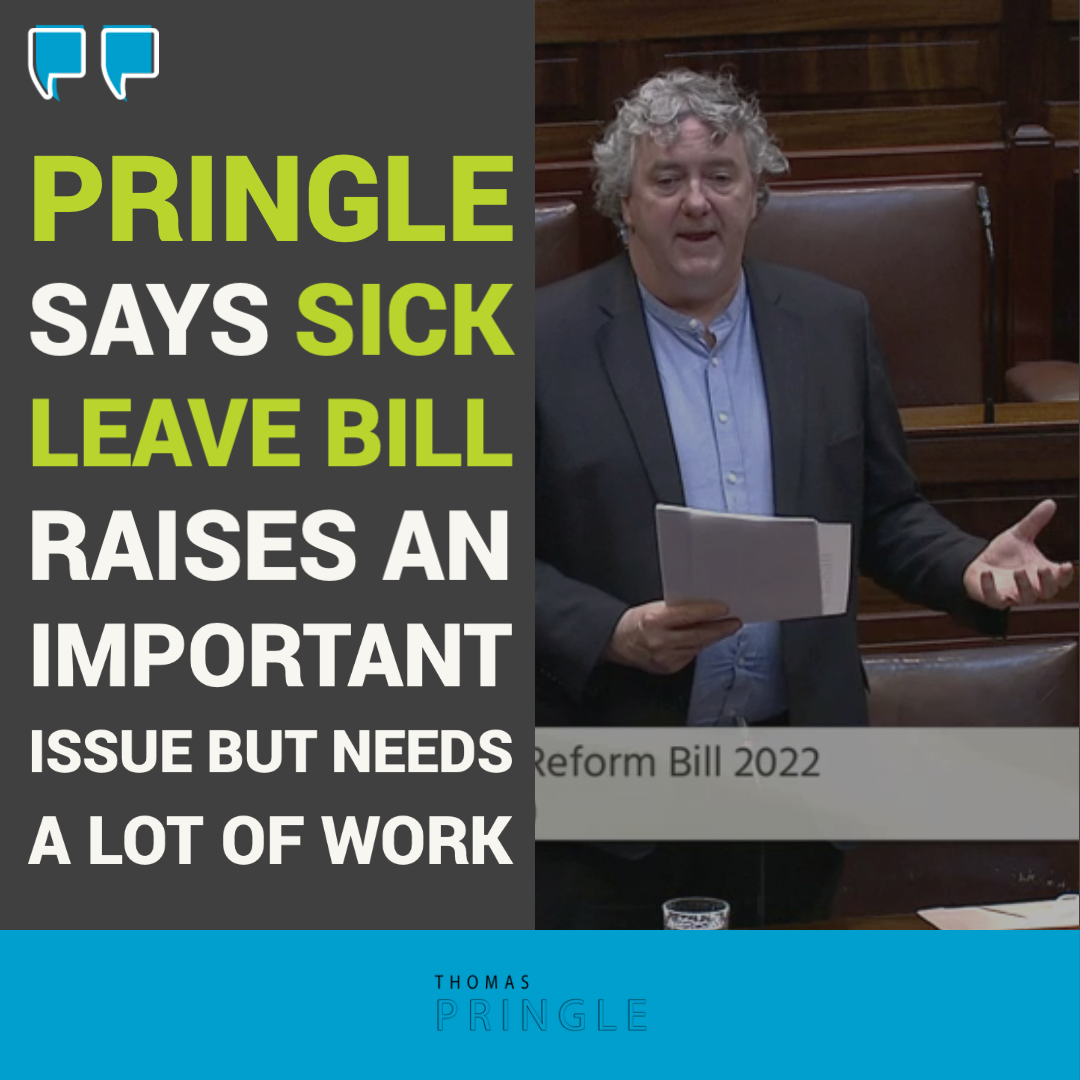- Pringle: We need a policy that recognises the importance of inshore fishing
- Pringle: Disabled people and carers face crisis of State neglect
- Pringle: Failed FF/FG housing policies forcing people to put their lives on hold
- Pringle welcomes Donegal council motion on Occupied Territories Bill: ‘We cannot stand by in the face of genocide’
Pringle says sick leave bill raises an important issue but needs a lot of work
- Updated: 11th April 2022

Independent TD for Donegal, Thomas Pringle, said he fully supports workers’ rights to statutory sick pay, but the bill before the Dáil on the matter has a long way to go before it addresses the issue.
Addressing the Dáil on Thursday, Deputy Pringle said: “The fact that this country has never had a statutory sick pay scheme needs to change.” However, he said, the bill “has to be very much a start, I think, because it really has a long way to go to be adequate in any way at all.”
The deputy was speaking on the Sick Leave Bill 2022.
The current illness benefit scheme does not cover employees for their first three days of illness, meaning people who are sick for three days must take a cut in their wage. This is not acceptable, he said.
Deputy Pringle said: “This, unfortunately, causes people to come into work despite being sick, which is not only unsafe for the person that is sick, but it is also unsafe for their co-workers.
“It is disappointing that Covid has forced people to realise this fact. But I am glad that this issue is finally being addressed,” he said. People should be able to afford to take sick days when they’re sick, he said.
The deputy said mandatory sick pay will benefit the workforce, employers and society as a whole.
However, he said, unless the bill is amended, term-time and seasonal workers will have to repeatedly build up entitlement to sick pay, leaving them without coverage for three months a year. The 13 weeks’ continuous service required before the entitlement commences will leave hundreds of thousands of workers without coverage for three months each year. That’s wrong and should be addressed, he said.
Deputy Pringle said: “This would affect a lot of people in my constituency of Donegal and particularly my town of Killybegs. We rely on seasonal work and a significant amount of people in this area have seasonal jobs, such as fishing, work in the fish factories and hospitality jobs.”
He said: “We need to make sure that holes in this legislation are addressed.”
The deputy also took issue with the fact that the bill would put sole responsibility of the payment of sick pay on the employer, saying, “I wonder if the intention of this bill was actually to save the state a cost, rather than to strengthen employees’ rights to sick pay.”
Deputy Pringle said more needs to be done to support employers in providing sick pay. He said: “I believe that the sick pay scheme should include a combination of Illness Benefit with a top-up payment paid by employers. And that would give a scheme that I think would be useful to everybody.”
Everyone who pays PRSI should be eligible to receive a sick payment from the State, he said. The deputy said the scheme should also include a self-certification period of up to two days’ sick leave, a common feature in many other countries.
He noted that for many workers on minimum wage or slightly above, the amount they get in sick pay would be less than the fee for a doctor’s visit to obtain a cert, and that must also be addressed.
Deputy Pringle said the number of days allowed for sick leave should not depend on how the economy is functioning, but on “whether a person requires it and the fact that it is right”.
He said: “I do support this bill in essence, but it falls short in too many ways.”



